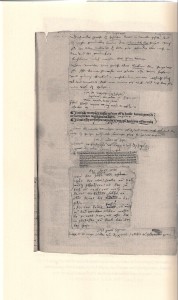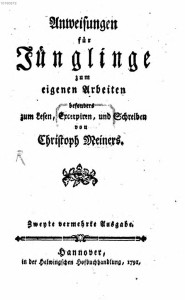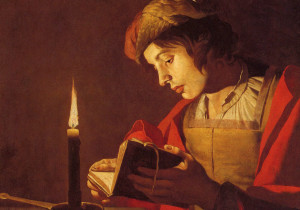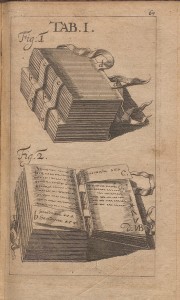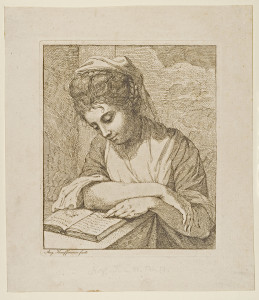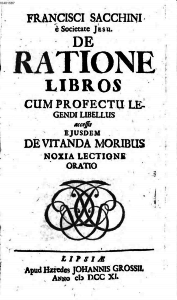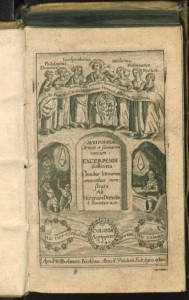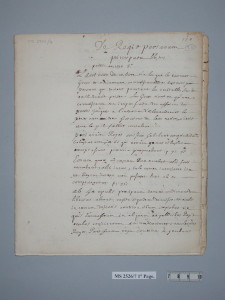This project investigates transformations in reading and writing with regard to the practices of excerpting, citing and plagiarizing from the early modern period up to the present day, across all of Europe. The C18th deserves particular attention here as a transitionary period and link between the humanistic tradition and the present day.
Presentation
Team
Publications & talks related to the project
Events
Presentation
Reading as activity
Reading, excerpting and connected practices such as citing and plagiarising are fundamental activities within written knowledge production and circulation. They are practiced across cultures, eras and disciplines. Their different forms and practices were for a long time overshadowed by historical and philological interests. With digitisation – which has connected collecting, saving and circulating information to new technical possibilities – it has recently become of greater interest to investigate intellectual and literary production with regard to these changing practices and technologies.
From excerpting to writing
The point of departure for this project’s investigations is the practice of excerpting. Althought the history of reading is an important field within humanities research, there has still been little investigation into the art of the “excerpt” or “extract” (Latin: excerptum; French: extrait; Italian: estratto) and the connected practice of collecting reading records (click here for further reading). Since the Renaissance, European scholars were required to keep excerpt books – collections of reading notes. These excerpt books – which were available at any time, and which could be enriched with new information with every reading and could occasionally reach the size of handwritten libraries – served, on the one hand, as a storage space for selected extracts, citations, tropes and ideas. On the other hand, they were used as quarries, from which materials for the production of the writer’s own works could be extracted.
Between the reading store and the writing factory
Such excerpt books are extraordinarily valuable sources for the history of reading and writing, and hence also that of citation, adaptation and plagiarism. They provide important information about at least two central aspects of the production of texts. One the one hand, the reading habits of those making the excerpts are documented: excerpt books demonstrate familiarity with this or that author, a preference for this or that discipline. However, their significance is not limited to providing a register of works read or lists of sources. Excerpt books are also the seeds of writers’ own works. They offer an insight into a writer’s workshop. We can see from them how a writer takes up and transforms in their own work something they have read in another’s.
Questions
The project primarily investigates four aspects of practice of excerpting:
Firstly, light should be thrown on the historical context and tradition in which the reading and writing method of excerpting is embedded. This will involve not only an analysis of the early modern context in which the widespread reading practice of excerpting developed, but also the continuing development of its forms up to the C20th and beyond. A central role was played in connection with this by the Enlightenment, a period in which, on the one hand, the ars excerpendi was sharply criticized as a simple exercise in copying, but on the other, intensive use was made of traditional (and also new) forms of knowledge acquisition.
Beyond the diachronic dimension, comparisons between different European regions and language areas will be made in order to develop new approaches to a more differentiated cultural history of reading, writing, and text and knowledge circulation in Europe.
The next step will address the effect of excerpting on writing. In other words, does this form of reading bring a particular form of writing with it? If so, which?
Finally, how the reading practice of excerpting relates to central concepts of our modern understanding of literature (author, original and originality, imitation, copy, invention, plagiarism) will be investigated, along with why excerpts and the practice of excerpting are still not given the attention they deserve today.
Publications & talks related to the project
Publications
2019
H. Zedelmaier, Le zèle érudit. Remarques sur un cliché franco-allemand. In: Les échanges savants franco-allemands au XVIIIe siècle. Transferts, circulations et réseaux. Ed. by C. Gantet and M. Meumann. Rennes 2019, pp. 87-99.
—, Die mathematisch-physikalischen Sammlungen der Universität Ingolstadt im Kontext. In: Die Sammlungen der Ludwig-Maximilians-Universität München gestern und heute. Eine vergleichende Bestandsaufnahme 1573-2016. Ed. by K. Weigand and C. Stein. Munich 2019, pp. 313-327.
M. Rottmann, (Rev.) S. Efimova, Das Schriftsteller-Notizbuch als Denkmedium in der russischen und deutschen Literatur. Paderborn 2018. In: Zeitschrift für Germanistik NF XXIX (2019), pp. 463-466.
—, Nietzsche als Leser und Exzerptor. In: Übermensch. Friedrich Nietzsche und die Folgen. Katalog zur Sonderausstellung, 15. Okt. 2019 bis 22. März 2020, Historisches Museum Basel. Ed. by Benjamin Mortzfeld. Basel 2019, pp. 59-63.
2018
E. Décultot, Exzerpt. In: Das 18. Jahrhundert. Lexikon zur Antikerezeption in Aufklärung und Klassizismus (Neuer Pauly Supplemente 13). Ed. by J. Jacob and J. Süßmann. Stuttgart 2018, pp. 199-203.
M. Rottmann, Vom Kritiker zum Akteur. Unzulängliche Versuche einer ‹Entzauberung› Friedrich Nietzsches. In: Nietzscheforschung 25,8 (2018). Special issue: «… so erzähle ich mir mein Leben.» Über den Zusammenhang von Biographie, Philosophie und Literatur bei Nietzsche. Ed. by R. Reschke, pp. 471-481.
2017
E. Décultot and H. Zedelmaier (ed.), Exzerpt, Plagiat, Archiv. Untersuchungen zu neuzeitlichen Schriftkultur. Halle/Saale 2017.
—, Zur Einführung (with H. Zedelmaier). In: Exzerpt, Plagiat, Archiv. Untersuchungen zu neuzeitlichen Schriftkultur. Ed. by E. Décultot and H. Zedelmaier. Halle/Saale 2017, pp. 7-15.
H. Zedelmaier, Heumanns Conspectus reipublicae literariae – Besonderheit, Kontext, Grenzen. In: Christoph August Heumann (1681-1764): Gelehrte Praxis zwischen christlichem Humanismus und Aufklärung. Ed. by M. Mulsow, K. Eskildsen and H. Zedelmaier. Stuttgart 2017, pp. 71-89.
—, Zur Einführung: Warum Christoph August Heumann? (with M. Mulsow). In: Christoph August Heumann (1681-1764): Gelehrte Praxis zwischen christlichem Humanismus und Aufklärung. Ed. by M. Mulsow, K. Eskildsen and H. Zedelmaier. Stuttgart 2017, pp. IX-XIV.
—, Bibliothek und Archiv (with M. Friedrich). In: Handbuch Wissenschaftsgeschichte. Ed. by M. Sommer, S. Müller-Wille and C. Reinhardt, Stuttgart 2017, pp. 265-275.
—, Die mathematisch-naturkundliche Sammlung des Benediktinerreichsstiftes Irsee im 18. Jahrhundert – Annäherungen und Kontexte. In: Katholische Aufklärung im Benediktinerreichsstift Irsee. Ed. by M. Herzog and A. Schmid. Konstanz and Munich 2017, pp. 287-303.
M. Rottmann, Subtile Lektüren. Nietzsches Weg mit Winckelmann. In: Jahrbuch der Klassik Stiftung Weimar (2017). Special issue: Die Erfindung des Klassischen. Winckelmann-Lektüren in Weimar. Ed. by F. Bomski, H. Th. Seemann and Th. Valk. Göttingen 2017, pp. 269-294.
—, Kein Leser Winckelmanns und doch Experte. Über Nietzsches Lektüren, den Sinn ihrer Erforschung und Mazzino Montinari. In: Nietzscheforschung. Jahrbuch der Nietzsche-Gesellschaft 24 (2017). Special issue: »An Winckelmann anzuknüpfen«? Winckelmanns Antike, Nietzsches Klassizismuskritik und ihre Blicke in die Zukunft. Ed. by R. Reschke. Berlin and Boston 2017, pp. 35-57.
2016
E. Décultot, The Art of Excerpting in the Eighteenth Century Literature: Subversion and Continuity of an Old Scholarly Practice. In: Forgetting Machines: Knowledge Management Evolution in Early Modern Europe. Ed. by A. Cevolini. Leiden and Boston 2016, pp. 105-127.
—, Lesen versus sehen? Winckelmanns Umgang mit den gegenständlichen und schriftlichen Quellen zur antiken Kunst. In: Literatur und praktische Vernunft. Festschrift für Friedrich Vollhardt zum 60. Geburtstag. Ed. by F. von Ammon, C. Rémi and G. Stiening. Berlin and Boston 2016, pp. 317-334.
H. Zedelmaier, Suchen und Finden vor Google: Zur Metadatenproduktion im 16. Jahrhundert. In: For the Sake of Learning. Essays in Honor of Anthony Grafton. Ed. by A. Blair and A.-S. Going. Leiden and Boston 2016, pp. 423-440.
—, Christoph Just Udenius and the German ars excerpendi around 1700: On the Flourishing and Disappearance of a Pedagogical Genre. In: Forgetting Machines. Knowledge Management Evolution in Early Modern Europe. Ed. by A. Cevolini. Leiden and Boston 2016, pp. 79-104.
—, Neue Erfahrungen / Alte Texte. Anmerkungen zum frühneuzeitlichen Diskurs über die «Neue Welt». In: Neue Diskurse der Gelehrtenkultur in der Frühen Neuzeit. Ein Handbuch. Ed. by H. Jaumann and G. Stiening. Berlin and New York 2016, pp. 439-456.
—, Bücher lesen über das Suchsystem Index. In: Textkünste. Buchrevolutionen um 1500 (exhibition catalogue). Ed. by U. J. Schneider. Darmstadt 2016, pp. 180-183 (translated into French: Lire des livres à travers un système de recherche: l’index. In: Les arts du texte. La révolution du livre vers 1500. Ed. by U. J. Schneider. Lyon 2016, pp. 180-183).
—, Viel zu viele Bücher. Bibliotheken im Spiegel des Nachdenkens über Glaubenssicherung und Wissensbewahrung im 16. Jahrhundert. In: Wissensspeicher der Reformation. Die Marienbibliothek und die Bibliothek des Waisenhauses in Halle (Kataloge der Franckeschen Stiftungen 34). Ed. by D. Zerbe. Halle/Saale 2016, pp. 19-33.
—, (Rev.) T. Bulang, Enzyklopädische Dichtungen. Fallstudien zu Wissen und Literatur in Spätmittelalter und früher Neuzeit. Berlin 2011 In: Arbitrium 34,1 (2016), pp. 36–38.
—, (Rev.) M. Mulsow and F. Rexroth (ed.), Was als wissenschaftlich gelten darf. Praktiken der Grenzziehung in Gelehrtenmilieus der Vormoderne. Frankfurt a.M. and New York 2014. In: Zeitschrift für Historische Forschung 43 (2016), pp. 328f.
—, (Rev.) K. Lohsträter and F. Schock (ed.), Die gesammelte Welt. Studien zu Zedlers Universal-Lexicon. Wiesbaden 2013. In: Zeitschrift für Historische Forschung 43 (2016), pp. 437f.
Talks
2019
Dec. 3, 2019: E. Décultot, Vom Lektürespeicher zur Schreibfabrik. Exzerpieren im 18. Jahrhundert. Within the workshop «Zwischen Exzess und Disziplinierung. Lektüren und Lektüretechniken im 18. Jahrhundert», organized by Dr. Felix Christen, Prof. Dr. Davide Giuriato, Dr. Philipp Hubmann and Dr. Thomas Traupmann. Institution: Universität Zürich, Deutsches Seminar. Location: Zürich.
Nov. 18, 2019: M. Rottmann, «Nur dumm, dass gerade dieses Problem Husserl total gegen den Strich geht.» Methode und Praxis in der Nietzscheforschung am Beispiel Karl Löwith. Within the workshop «‹personae, rather than persons?›. Wissenschafts- und Fachgeschichte zwischen Personen-, Institutionen- und Praxisgeschichte», organized by Mike Rottmann and Karena Weduwen. Institution: Internationales Kolleg Morphomata der Universität zu Köln. Location: Cologne.
Nov. 16, 2019: M. Rottmann, Der Nachlass als hermeneutische Herausforderung. Within the conference «In Stein gemeißelt?! Zum Umgang mit vergangenem Leben und Werk», organized by Luisa Karge. Institution: Hans-von-Soden-Institut für theologische Forschung an der Philipps-Universität Marburg. Location: Marburg.
Nov. 8, 2019: M. Rottmann, Traditionen: Aspekte des Nietzsche-Kommentars. Organized by PD Dr. Felix Christen, Prof. Dr. Mark-Georg Dehrmann und Prof Dr. Christoph König. Institution: Peter Szondi-Kollegs der Universität Osnabrück. Location: Goethe- und Schiller-Archiv Weimar.
Oct. 29, 2019: M. Rottmann, Why Should a ‹Free Spirit› Read and Take Notes? Within the conference «Comment comprendre Nietzsche, selon Nietzsche? Interprétation, traduction, edition / Nietzsche on Making Sense of Nietzsche. Interpretation, Translation, Editing», organized by Prof. Dr. Martine Béland, Prof. Dr. Chiara Piazzesi, Prof. Dr. Patrick Wotling. Institution: Canadian Centre for German & European Studies, University of Montreal. Location: Montreal, Canada.
Oct. 24, 2019: H. Zedelmaier, Vom sozialen Leben der Objekte. Sammlungen in Bewegung in Geschichte und Gegenwart. Evening lecture within the conference «Sammeln und Zerstreuen», 24–26 October 2019, organized by Historische Kommission für Sachsen-Anhalt. Institution: Schloss Wittenberg, Stiftung Leucorea. Location: Wittenberg.
Oct. 17, 2019: H. Zedelmaier, Zur Geschichte des Exzerpierens. Eine Skizze. Within the conference «Dante‘s Convivio and the Evolution of Encyclopedism in the 13th and 14th Century», 16–18 October 2019, organized by Prof. Dr. Franziska Meier. Institution: Seminar für Romanische Philologie, Göttinger Dante Forum. Location: Göttingen.
Oct. 2, 2019: M. Rottmann, Nietzsche exzerpiert. Organized by Prof Dr. Hubert Thüring. Institution: Deutsches Seminar der Universität Basel. Location: Basel.
Sept. 30 – Oct. 2, 2019: E. Décultot, Ausgelagertes Buchwissen: zu Winckelmanns Ökonomie des Exzerpts. Within the conference «Wissen in Buchgestalt», organized by Prof. Dr. Gyburg Uhlmann. Institution: Freie Universität Berlin (SFB 980 «Episteme in Bewegung»). Location: Berlin.
Sept. 19-20, 2019: E. Décultot, Autopsie und Lektüre. Zu Winckelmanns Umgang mit Gesehenem und Gelesenem. Ein Beitrag zur Wissenschaftsgeschichte der Kunstgeschichte. Within the workshop «Exzerpieren in der Neuzeit», organized by Prof. Dr. Elisabeth Décultot. Institution: Interdisziplinary Centre for European Enlightenment Studies. Location: Halle/Saale.
Sept. 16, 2019: M. Rottmann, Warum sollte ein ‹freier Geist› lesen und exzerpieren? Überlegungen zu Friedrich Nietzsches Lese- und Schreibpraktiken und zur Geschichte ihrer Erforschung. Organized by Prof. Dr. Michael Hagner. Institution: Professur für Wissenschaftsforschung, ETH Zürich. Location: Zurich.
July 4, 2019: M. Rottmann, Auf dem Weg zum Mustergelehrten? Friedrich Nietzsches Lese- und Schreibpraktiken bis zur Basler Professur (1858–1869). Within the conference «Extrahieren, Speichern, Verwerten. Zur Verwaltung des Gelesenen bei Schriftstellern und Gelehrten», organized by Prof. Dr. Elisabeth Décultot, Mike Rottmann, Prof. Dr. Helmut Zedelmaier. Institution: Germanistisches Institut, Martin-Luther-Universität Halle-Wittenberg. Location: Halle.
June 14, 2019: M. Rottmann, Philosophen bei der Arbeit mit Büchern. Digitale Autorenbibliotheken und die Zukunft geisteswissenschaftlicher Methoden. Within the conference «Philosophen bei der Arbeit mit Büchern. Digitale Autorenbibliotheken und die Zukunft geisteswissenschaftlicher Methoden», organized by Prof. Dr. Paolo D’Iorio, Prof. Dr. Helmut Heit, Mike Rottmann, Prof. Dr. Andreas Urs Sommer. Institution: Kolleg Friedrich Nietzsche, Klassik Stiftung Weimar in cooperation with Institut des textes et manuscrits moderne, École normale supérieure de Paris (CNRS) and Forschungsstelle Nietzsche-Kommentar. Location: Goethe- und Schiller-Archiv Weimar.
June 13-15, 2019: E. Décultot, Der Schriftsteller als Kopist. Exzerpieren im 18. Jahrhundert. Within the conference «Gelehrsamkeiten. Text- und Lebenspraktiken im langen 18. Jahrhundert», organized by Dr. Thomas Assinger and Dr. Daniel Ehrmann. Institution: Universität Salzburg. Location: Salzburg.
May 14-15, 2019: E. Décultot, Exzerpte. Überlegungen zur digitalen Edition einer besonderen Textsorte am Beispiel Winckelmanns. Within the conference «Platon Digital. Abschlusstagung», organized by Prof. Dr. Paul Molitor (Universität Halle) and Prof. Dr. Charlotte Schubert (Universität Leipzig). Institution: Volkswagenstiftung. Location: Schloss Herrenhausen, Hannover.
Feb. 13, 2019: E. Décultot, Copier: l’art de l’extrait dans l’Europe du 18e siècle. Guest lecture within the framework of the École Doctorale «Europe Latine – Amérique Latine», organized by Christian Del Vento. Institution: Université Sorbonne Nouvelle, Paris 1, Maison de la Recherche. Location: Paris.
Jan. 29, 2019: E. Décultot, Exzerpte. Definition, Transformation und Editionsgeschichte. Guest lecture within the framework of the DFG-Graduiertenkolleg «Dokument – Text – Edition», organized by Prof. Dr. Wolgang Lukas. Location: Universität Wuppertal.
2018
Nov. 30, 2018: H. Zedelmaier, Wie wird man Polyhistor? Uffenbachs frühe gelehrte Sozialisation. Within the conference «Zacharias Conrad von Uffenbach in seiner Zeit – Wissen und Gelehrtenkultur um 1700», organized by Prof. Dr. Markus Friedrich and PD Dr. Monika E. Müller. Institution: Universität Hamburg, Staats- und Universitätsbibliothek Hamburg and SFB 950 «Manuskriptkulturen in Asien, Afrika und Europa», 30.11.-1.12.2018. Location: Universität Hamburg, Staats- und Universitätsbibliothek.
Nov. 26-27, 2018: E. Décultot, Lire, copier, écrire. Enquête sur la bibliothèque manuscrite de Johann Joachim Winckelmann. Within the conference «Winckelmann et l’œuvre d’art. Matériaux et types», organized by Dr. Cécile Colonna, Prof. Dr. Daniela Gallo, Prof. Dr. Thomas Kirchner, Prof. Dr. Alain Schnapp. Location: Paris, Centre allemand d’histoire de l’art et Bibliothèque Nationale de France, Département des Manuscrits.
Nov. 16, 2018: M. Rottmann, Verstehendes Entziffern – entzifferndes Verstehen. Oder: Wie interpretiert man Lesespuren? Eine Annäherung anhand von Friedrich Nietzsches Lesespuren. Within the conference «Randkulturen. Lese- und Gebrauchsspuren in Autorenbibliotheken des 19. und 20. Jahrhunderts», organized by Anke Jaspers and Prof. Dr. Andreas B. Kilcher. Institution: ETH Zürich/ Professur für Literatur- und Kulturwissenschaft. Location: Zürich.
Nov. 8, 2018: M. Rottmann, Quelle? Exzerpt? Text? Überlegungen zum epistemischen Potential von Lektürespeichern und den Möglichkeiten (und Grenzen) ihrer Kommentierung. Within the conference «Nietzsches Nachlass», organized by Prof. Dr. Andreas Urs Sommer, PD Dr. Sebastian Kaufmann and Prof. Dr. Katharina Grätz. Institution: Heidelberger Akademie der Wissenschaften. Location: Heidelberg.
Oct. 19, 2018: M. Rottmann, Was bleibt vom Exzerpt in der Edition? (Un-)Edierte Exzerpte bei Lessing, Marx und Nietzsche. Within the conference «(un)documented – Was bleibt vom Dokument in der Edition?», organized by the Graduate School «Dokument – Text – Edition», Bergische Universität Wuppertal. Location: Wuppertal.
Sept. 26, 2018: M. Rottmann, Vom Leben und Sterben ›großer Exzerpte‹. Zu Überlieferung und Edition prekärer Materialien in der Aufklärung. Within the workshop «Exzerpieren. Eine Lese- und Schreibpraxis in europäischer Perspektive», organized by the Humboldt Professorship (Prof. Dr. Elisabeth Décultot, Prof. Dr. Helmut Zedelmaier, Mike Rottmann). Location: Halle/Saale (IZEA).
June 1, 2018: M. Rottmann, Nietzsches Exzerpte. Probleme von Edition, Kommentar und Interpretation zwischen Nachlass und Werk. Within the workshop «Hermeneutische Probleme im Umgang mit Nietzsches Nachlass», organized by Giulia Baldelli, Fabian Mauch, Axel Pichler and Susanna Zellini. Institution: Stuttgart Research Centre for Text Studies der Universität Stuttgart/Internationale Nietzscheforschungsgruppe Stuttgart (INFG). Location: Stuttgart.
May 24, 2018: E. Décultot, Lesen, kopieren, schreiben. Die Praxis des Exzerpierens und das Problem der Originalität im 18. Jahrhundert. At the invitation of Prof. Dr. Elisabeth Oy-Mara. Institution: Universität Mainz, Kunsthistorisches Seminar. Location: Mainz.
April 19, 2018: M. Rottmann, Löwiths Dissertation über Nietzsche. Within the workshop «Treffen des Arbeitskreises Karl Löwith», organized by Prof. Dr. Matthias Bormuth and Dr. Ulrich von Bülow. Institution: Deutsches Literaturarchiv. Location: Marbach am Neckar.
Feb. 22, 2018: H. Zedelmaier, Universitätsgeschichte als biographisches Unternehmen. Within the conference «Universitätsgeschichte als Projekt und Programm: Kategorien und Perspektiven», organized by Prof. Dr. H.-M. Körner. Institution: Universitätsarchiv LMU München. Location: Internationales Begegnungszentrum der Wissenschaften München.
Jan. 9, 2018: E. Décultot, Der Schriftsteller als Kopist. Die Kunst des Exzerpierens in der europäischen Literatur des 18. Jahrhunderts. Within the series of lectures «Die Materialität von Schriftlichkeit», organzied by Rainer Falk and Christian Mathieu. Location: Staatsbibliothek zu Berlin.
2017
Dec. 14, 2017: H. Zedelmaier, Provenienz braucht Referenz, aus der Erfahrung in der Marienbibliothek in Halle (Saale). Within the conference «Der komplexe Faden der Herkunft: Provenienz», organized by the Forschungsverbund Marbach-Weimar-Wolfenbüttel. Location: Wissenschaftskolleg zu Berlin.
Aug. 8, 2017: H. Zedelmaier, De arte excerpendi: Überlegungen zur Tätigkeit und Geschichte des Exzerpierens. Location: Gottfried Wilhelm Leibniz Bibliothek – Niedersächsische Landesbibliothek, Hannover.
June 28, 2017: M. Rottmann, Von Eselsohren zu Hornochsen. Friedrich Nietzsche als Leser. Within the opening event «Feierliche Eröffnung der Forschungsstelle Naumburg des DFG-Projektes Nietzsches Bibliothek», organized by the Department of Philosophy, Albert-Ludwigs-Universität Freiburg. Location: Nietzsche-Dokumentationszentrum Naumburg.
2016
Nov. 17, 2016: H. Zedelmaier, Gelehrter Fleiß. Anmerkungen zu einem deutsch-französischen Klischee. Within the conference «Transferts, circulations et réseaux savants franco-allemands au XVIIIe siècle / Deutsch-französische Wissenstransfers, Zirkulationen und Netzwerke im 18. Jahrhundert», 16 –18 Nov 2016, organized by Prof. Dr. Claire Gantet. Institution: Université de Fribourg, Faculté des Lettres. Location: Fribourg/Switzerland.
Nov. 8, 2016: E. Décultot, Introduction to the special section «Lesen, Exzerpieren, Zitieren: Herstellung von Zusammenhang» of the conference «Autorschaft und Bibliothek», organized by Caroline Jessen and PD Dr. Stefan Höppner. Institution: Forschungsverbund Marbach-Weimar-Wolfenbüttel. Location: Weimar, Goethe Nationalmuseum.
Oct. 31, 2016: H. Zedelmaier, Bibliotheken in Bewegung. Opening lecture for the exhibition «Wissensspeicher der Reformation. Die Marienbibliothek und die Bibliothek des Waisenhauses in Halle», organized by the Francke Foundations. Location: Halle (Saale).
Sept. 12, 2016: E. Décultot, Lesen, Kopieren, Schreiben. Lese- und Exzerpierkunst in der europäischen Literatur des 18. Jahrhunderts. Within the workshop «Leseszenen», 12–14 Sept 2016, organized by Prof. Dr. Davide Giuriato, Prof. Dr. Alfred Messerli, Prof. Dr. Klaus Müller-Wille and Prof. Dr. Sandro Zanetti. Institution: Romanisches Seminar, Universität Zürich. Location: Zurich.
Sept. 12, 2016: H. Zedelmaier, Christoph Just Udenius und die deutsche ‚ars excerpendi‘ um 1700. Vom Blühen und Verschwinden einer pädagogischen Textsorte. Within the workshop «Leseszenen», 12–14 Sept 2016, organized by Prof. Dr. Davide Giuriato, Prof. Dr. Alfred Messerli, Prof. Dr. Klaus Müller-Wille and Prof. Dr. Sandro Zanetti. Institution: Romanisches Seminar, Universität Zürich. Location: Zurich.
June 1, 2016: E. Décultot, Handgeschriebene Bibliotheken als Wissensspeicher. Vom Umgang mit Exzerpten im 18. Jahrhundert. At the invitation of Prof. Dr. Siegrid Westphal and Prof. Dr. Wolfgang Adam. Institution: Interdisziplinäres Institut für Kulturgeschichte der Frühen Neuzeit, Universität Osnabrück. Location: Osnabrück.
May 25, 2016: E. Décultot: Handgeschriebene Bibliotheken. Exzerpt und Buchaneignung im 18. Jahrhundert. At the invitation of Dr. Wolfram Horstmann and Prof. Dr. Gerhardt Lauer. Institution: Staats- und Universitätsbibliothek Göttingen. Location: Göttingen.
Feb. 18, 2016: H. Zedelmaier, Die Naturwissenschaftlichen Sammlungen der Universität Ingolstadt. Within the conference «Die Wissenschaftlichen Sammlungen der Ludwig-Maximilians-Universität München», 17–19 Feb 2016, organized by Prof. Dr. H.-M. Körner. Institution: Universitätsarchiv LMU München. Location: Munich.
Jan. 20, 2016: H. Zedelmaier, Bücher über Bücher. Zur Informationsverarbeitung im 16. Jahrhundert. At the invitation of Prof. Dr. Siegrid Westphal and Prof. Dr. Wolfgang Adam. Institution: Interdisziplinäres Institut für Kulturgeschichte der Frühen Neuzeit, Universität Osnabrück. Location: Osnabrück.
2015
Nov. 9, 2015: E. Décultot, Über das Besitzen von Büchern. Exzerpt und Buchaneignung im 18. Jahrhundert. Within the workshop «Spur und Kontext. Sachkulturen in Bibliotheken von Schriftstellern und Gelehrten», organized by Dietrich Hakelberg, HAB Wolfenbüttel, Susanna Brogi, Deutsches Literaturarchiv Marbach (project «Autorenbibliotheken. Materialität – Wissensordnung – Performanz»). Institution: Herzog August Bibliothek Wolfenbüttel. Location: Wolfenbüttel.
Nov. 4, 2015: E. Décultot, Lese- und Exzerpierkunst in der europäischen Literatur des 18. Jahrhunderts. Within the series of lectures «Leipziger Literaturwissenschaftliches Colloquium (LLC)», organized by Dr. Dieter Burdorf, Dr. Leonhard Herrmann and Prof. Dr. Dirk Werle. Institution: Universität Leipzig, Institut für Germanistik. Location: Leipzig.
July 6, 2015: E. Décultot, Der Plagiatbegriff zwischen Früher Neuzeit und Moderne. Contribution to the panel discussion «Originalität, Priorität und Reputation. Leibniz und Newton», organized by Prof. Dr. Christoph Markschies and Dr. Christiane Lahusen. Institution: Berlin-Brandenburgische Akademie der Wissenschaften. Location: Berlin.
Events
2019
International Workshop
Exzerpieren in der Neuzeit (Sept. 19-20, 2019). Organized by the Humboldt professorship (Prof. Dr. Elisabeth Décultot, Prof. Dr. Helmut Zedelmaier and Mike Rottmann M.A.).
Workshop
Extrahieren, Speichern, Verwerten. Zur Verwaltung des Gelesenen bei Schriftstellern und Gelehrten (July 4, 2019). Organized by the Humboldt professorship (Prof. Dr. Elisabeth Décultot, Prof. Dr. Helmut Zedelmaier and Mike Rottmann M.A.).
2018
International Workshop
Exzerpieren. Eine Lese- und Schreibpraxis in europäischer Perspektive / Making Excerpts. European Perspectives on Reading and Writing Practices / L’art de l’extrait. Pour une histoire européenne (Sept. 25-26, 2018). Organized by the Humboldt professorship (Prof. Dr. Elisabeth Décultot, Prof. Dr. Helmut Zedelmaier and Mike Rottmann M.A.).
2017
Talk
Anthony Grafton (Princeton) – The Polyhistor in the Atlantic World: How Humanistic reading practices came to the American Colonies (June 20, 2017). At the invitation of the Humboldt professorship.
Please click here for the video.
2016/17
Series of lectures
Exzerpt, Zitat, Plagiat: Das prekäre Verhältnis von Originalität und Nachahmung. Organized by the Humboldt professorship (Prof. Dr. Elisabeth Décultot and Prof. Dr. Helmut Zedelmaier) in collaboration with the Interdisciplinary Center for Enlightenment Studies (IZEA), the Interdisciplinary Center for Pietism Research (IZP) and the Center of Excellence «Enlightenment – Religion – Knowledge» (ARW).
Alberto Cevolini (Univ. Modena) – Lob und Tadel der Räuberei. Exzerpieren, Plagiieren und Zitieren in der frühneuzeitlichen Schriftkultur (Oct. 24, 2016)
Panja Mücke (Hochschule für Musik und Darstellende Künste Mannheim) – Plagiate?! Von Spinnen, Bienen und Händel (Nov. 14, 2016)
Paul Peucker (Archivist of the Moravian Church in America, Northern Province, Editor, Journal of Moravian History) – In Staub und Asche: Archivierung und Kassation in Herrnhuter Archiven im 18. Jahrhundert (Dec. 5, 2016)
Nicola Kaminski (Universität Bochum) – „Halsstarrigkeit der Tugend“? Wie Lessing in einem Brief an Nicolai vom November 1756 Gottsched ‚zitiert‘ und einen epochalen Neuanfang inszeniert (Dec. 12, 2016)
Markus Friedrich (Universität Hamburg) – Familienpapiere, Familien aus Papier. Frühneuzeitliche Genealogie zwischen Wissenschaft, sozialer Praxis und paper technologies (Jan. 23, 2017)
Markus Krajewski (Universität Basel) – Rekursive Schreibakte. Robert Walser als Angestellter seiner selbst (Jan. 30,2017)
2015
Workshop
Hidden Hands. Methods of Collaboration in Early Modern Europe (June 9, 2015). Organized by the Humboldt professorship. Evening lecture by Ann Blair (Harvard University), followed by three short talks:
Martin Mulsow (Erfurt/Gotha) – Für eine Geschichte der Hiwis. Studenten als Schreiber und Redakteure um 1700
Ralph Häfner (Freiburg) – Die Bibliothek als Ort der Muße: Johann Albert Fabricius, der Bibliothekar Johann Friedrich Mayers
Helmut Zedelmaier (Munich) – Fürstenbibliotheken als Werkstätten des Wissens im 16. und 17. Jahrhundert.
See also the past events of the Humboldt Chair.
